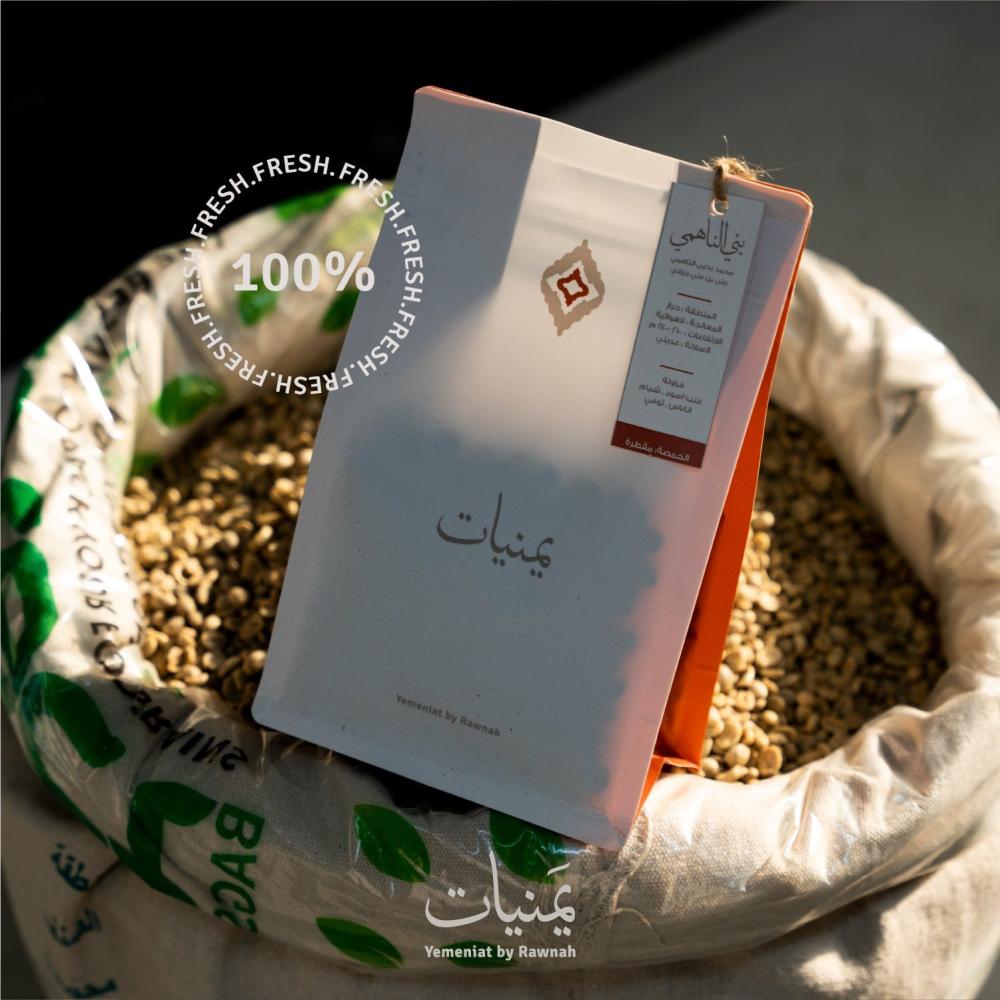كيف أصبح البن اليمني رمز للجودة؟
الأصالة تبدأ من البذرة:
تبدأ زراعة البن اليمني باختيار أفضل الحبوب من الموسم السابق ليتم استخدامها في الموسم الحالي، وهي عملية دقيقة يتأكد فيها الفلاحون من اختيار أجود أنواع الحبوب لتنتج حبوب بن بجودة عالية، كما أن المناخ في اليمن يساعد على زيادة جودة البن اليمني حيث أنها تزرع في أعالي جبال اليمن حيث الهواء النقي والأجواء الباردة، وبيئة لا تحب الحشرات العيش فيها فيقل استخدام المبيدات الحشرية وهذا ما يجعل البن اليمني يحافظ على جودته بسبب البيئة المثالية التي نشأ فيها.
الطرق التقليدية سر الجودة:
رغم تطور طرق الزراعة وكثرة الطرق السريعة للإنتاج حافظ الفلاحون اليمنيين على الزراعة التقليدية التي تعلموها من آبائهم وهذا حافظ على جودة اليمن فما زال يحتل المرتبة الأولى، تبدأ زراعة البن اليمني من اختيار حبوب بجودة عالية بعدها زراعتها في مشاتل مع تربة غنية بالفيتامين والمعادن، بعد ما تكبر الشتلات قليلًا يتم نقلها لأعالي الجبال حيث الهواء النقي لتكمل نموها، وبعد ثلاث أو أربعالأشجار، يتم قطف الثمار الناضجة يدويًا للتأكد من عدم قطف ثمار غير ناضجة، بعدها يبدأ الفلاحون بفرش أسطح منازلهم ووضع حبوب البن اليمني فيها وتغطيتها ليلًا لحفظها من الحشرات مع تحريك يومي للحبوب حتى تجف، وتبدأ بعد جفاف حبوب البن مرحبة التنظيف تتضمن إزالة القشور الخارجية بطريقة يدوية، بعدها تصنف الحبوب حسب الحجم واللون ويتم استبعاد أي حبوب تالفة، وتعبأ بعد ذلك في أكياس خاصة لتكون جاهزة للتحميص.
حافظ الفلاحون على الطرق التقليدية حفاظًا على نكهة البن اليمني العميقة.
طرق تحميص فريدة:
وتحمص حبوب البن بعد أن تجف، وتبدأ عملية التحميص بوضع البن في مقلاة معدنية كبيرة فوق النار في درجات حرارة ترتفع تدرجيًا، وتحرك باستخدام ملقة خشبية كبيرة ويتم ومراقبة الرائحة واللون، والتحميص أما يكون فاتحًا وتكون نكهته حمضية وفاكهية مناسب للقهوة المختصة، أو متوسطًا وتكون نكهته موزونه بين المرارة والحموضة وهو مناسب لتحضير القهوة التركية والإسبريسو، والتحميص الغامق ونكهته مدخة وكاكاو داكن مناسب للقهوة الفرنسية والعربية أحيانًا.
إرث عريق وثقافة متأصلة:
زُرعت القهوة ولأول مرة في اليمن في القرن الخامس عشر، ويقول المؤخرون أن فضل اكتشاف القهوة يعود للصوفيين وهم عباد يسهرون الليل للعبادة فبدأوا بشرب القهوة للسحر طويلًا في الليل، وذكر المؤرخون كذلك ثلاث أشخاص هم من اكتشفوا البن وهم علي الشاذلي ومحمد الذَّبحاني وأبو بكر العيدروس وهم علماء وفقهاء صوفيون فبدأت القهوة في انتشار في أنحاء الجزيرة العربية منذ ذلك الحين، وأصبحت مدين مخا الساحلية مركزًا لتجارة البن اليمني وشق البن اليمني طريقه للعالمية منذ القرن الخامس عشر.
رحلة إلى العالمية:
بدأت البن اليمني رحلة إلى العالمية عندما طرد العثمانيون البرتغاليين من سواحل البحر الأحمر بشكل كامل عام 1538م، فبدأوا عهدًا جديدًا من التجارة عبر موانئ البحر الأحمر انطلاقًا من ميناء المخا، وهو الاسم الذي تحول إلى ماركة عالمية MOCKA COFFEE وهو يعني البن اليمني(هذا ما أشارت إليه الباحثة اليمنية أروى الخطابي)، بعد ذلك وفي القرن السابع عشر تنبه الغربيون إلى قيمة الاقتصاد الكبيرة الممكن حصولها من محصول البن اليمني فقط، فبدأوا بزيارات لمعرفة الطبيعة الاقتصادية في اليمن وإمكانية التصدير، وأبحرت أول شحنة بن يمني من ميناء المخا إلى مراكز الهولنديين في شمال غربي الهند وبلاد الفرس، وأدى انتشار البن اليمني عالي الجودة إلى زيادة المنافسة على ميناء المخا من قبل الشركات الهولندية والفرنسية والبريطانية، فأنشأ الهولنديون أو معمل على أراضي مدينة مخا عالم 1709م وتبعتهم فرنسا.
وازدهت تجارة البن اليمني حتى وصل الإنتاج العام من محصول القهوة في القرن السابع والثامن عشر إلى ما يقارب أربعين ألف طن سنويًا، تصدر اليمن منها 30 إلى 35 طن تقريبًا، واستمرت شهرة البن اليمني عالي الجودة إلى أواخر القرن التاسع عشر وبعدها بدأت حروب أثرت على الاقتصاد العالم وبدأت دول كثيرة تزرع البن، ولكن حافظ البن اليمني على قيمته وظل صامدًا محاولًا رغم الظروف.
تحديات تواجه البن اليمني:
يواجه البن اليمني تحديات كثيرة تجعل انتاجه محدود مقارنة بغيره من أنواع البن، وهي التحديات تؤثر سلبًا على انتاجه ومن هذه التحديات:
- التحديات المناخية:
زيادة الخفاف وانخفاض معدلات الأمطار تؤثر على مزارع البن وخاصة البن في مناطق الجبال، وكذلك تعاني اليمن من نقص في المواد الأولية ومنها الماء مما يجبر الفلاحون من تقليل الإنتاج، وكذلك زيادة التصحر.
- التحديات الاقتصادية:
في اليمن لا يوجد أيدعم حكومي لزيادة انتاج البن اليمني ولا حتى مساعدات مما يُصعب على الفلاحون تطوير أساليب الزراعة، الاعتماد على الطرق التقليدية تؤثر على كمية الإنتاج.
- التحديات السياسية والأمنية:
تعيش الأمن في أوضاع غير مستقرة أمنيًا وهذا يعرقل عملية الإنتاج والتوزيع، مشاكل كثيرة في التصدير والاستيراد منها طرق برية غير آمنة، قيود مفروضة على التصدير تصعب العملية.
- تحديات ثقافية واجتماعية:
في ظل الظروف التي تعيشها اليمن يضطر كثير من الفلاحون إلى الهجرة إلى المدن مما يقلل أعداد الفلاحين، وكذلك الفلاحون أناس بسطاء لا يعلمون طرق التسعير على أساس الجودة مما يعرضهم للاستغلال من قبل بعض التجار.
- تحديات تقنية:
الفلاحون يعتمدون على طرق زراعية تقليدية تقلل الإنتاج بينما المنافسون يستخدمون تقنيات عالية، ولا يوجد في اليمن أي مراكز تدريب لتجديد الأيدي العاملة، بل يكفي الفلاحون بتعليم أبنائهم وهم ورثوها من أجدادهم.
- تحديات تسويقية:
رغم تاريخ البن اليمني إلا أنه لا يسوق كعلامة تجارية مثل القهو البرازيلية والأثيوبية، وأغلب الفلاحون يبيعون بشكل فردي مما يفقدهم القدرة على المنافسة.
البن اليمني ظل ثابتًا محافظًا على جودته بسبب فلاحون بسطاء عرفوا قيمة البن الذي بين أيديهم واعتنوا به جيدًا فالفلاح يهتم بشجرة البن اليمني كأنها فرد من العائلة تلقى اهتمامًا خاصًا لذا اشتهر بجودته إلى الآن؟
لماذا يمنيات؟
لأن يمنيات لا يكتفي فقط بتوفير البن اليمني، بل يختار أجود أنواع البن اليمني البن الذي صمد أمام كل التحديات، نقدم لك بننًا يمنيًا قويًا كالأرض التي نشأ فيها، لتستمتع بفنجان قهوة يحكي لك قصة صموده.

